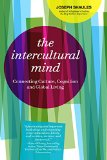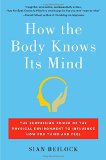January 12, 2015

The Intercultural Mind: Connecting Culture, Cognition, and Global Living by Joseph Shaules (Intercultural Press, 2015)
(amazon.co.uk)
Book description from the publisher:
In this pioneering book, Joseph Shaules explores exciting new research in cultural psychology and neuroscience, and explains how the new science of the mind can help us understand how the unconscious mind processes cultural differences, and how our sense of identity shapes how we view the world.
The Intercultural Mind presents new perspectives on important questions such as:
What is culture shock, and how does it affect us?
Why are we blind to our own cultural conditioning?
Can cultural differences be measured?
What does it mean to have an international mindset?
Illustrated with a wealth of examples and memorable stories, The Intercultural Mind is a fascinating look at how intercultural experiences can transform the geography of thinking.
Comments (0)
- culture,new books
January 8, 2015

How the Body Knows Its Mind: The Surprising Power of the Physical Environment to Influence How You Think and Feel by Sian Beilock (Atria Books, 2015)
(kindle ed.), (amazon.co.uk)
Book description from the publisher:
An award-winning scientist offers a groundbreaking new understanding of the mind-body connection and its profound impact on everything from advertising to romance.
The human body is not just a passive device carrying out messages sent by the brain, but rather an integral part of how we think and make decisions. In her groundbreaking new book, Sian Beilock, author of the highly acclaimed Choke, which Time magazine praised for its “smart tips…in order to think clearly…and be cool under pressure,” draws on her own cutting-edge research to turn the conventional understanding of the mind upside down in ways that will revolutionize how we live our lives.
At the heart of How the Body Knows Its Mind is the tantalizing idea that our bodies “hack” our brains. The way we move affects our thoughts, our decisions, and even our preferences for particular products. Called “embodied cognition,” this new science—of which Beilock is a foremost researcher—illuminates the power of the body and its physical surroundings to shape how we think, feel, and behave. Beilock’s findings are as varied as they are surprising. For example, pacing around the room can enhance creativity; gesturing during a speech can help ensure that you don’t draw a blank; kids learn better when their bodies are part of the learning process; walking in nature boosts concentration skills; Botox users experience less depression; and much more. From the tricks used by advertisers to the ways body language can improve your memory, Beilock explains a wealth of fascinating interconnections between mind and body and how mastering them can make us happier, safer, and more successful.
Google Books preview:
See also: Author’s website
Comments (0)
- cognitive science,new books
January 6, 2015

The Soul Fallacy: What Science Shows We Gain from Letting Go of Our Soul Beliefs by Julien Musolino (Prometheus Books, 2015)
(kindle ed.), (amazon.co.uk)
Book description from the publisher:
Most Americans believe they possess an immaterial soul that will survive the death of the body. In sharp contrast, the current scientific consensus rejects the traditional soul, although this conclusion is rarely discussed publicly. In this book, a cognitive scientist breaks the taboo and explains why modern science leads to this controversial conclusion. In doing so, the book reveals the truly astonishing scope and power of scientific inquiry, drawing on ideas from biology, psychology, neuroscience, philosophy, and the physical sciences.
Much more than chronicling the demise of the traditional soul, the book explores where soul beliefs come from, why they are so widespread culturally and historically, how cognitive science offers a naturalistic alternative to religious conceptions of mind, and how postulating the existence of a soul amounts to making a scientific claim.
Although the new scientific view of personhood departs radically from traditional religious conceptions, the author shows that a coherent, meaningful, and sensitive appreciation of what it means to be human remains intact. He argues that we do not lose anything by letting go of our soul beliefs and that we even have something to gain.
Throughout, the book takes a passionate stand for science and reason. It also offers a timely rejoinder to recent claims that science supports the existence of the soul and the afterlife.
Google Books preview:
Author interview:
Comments (0)
- new books,self





